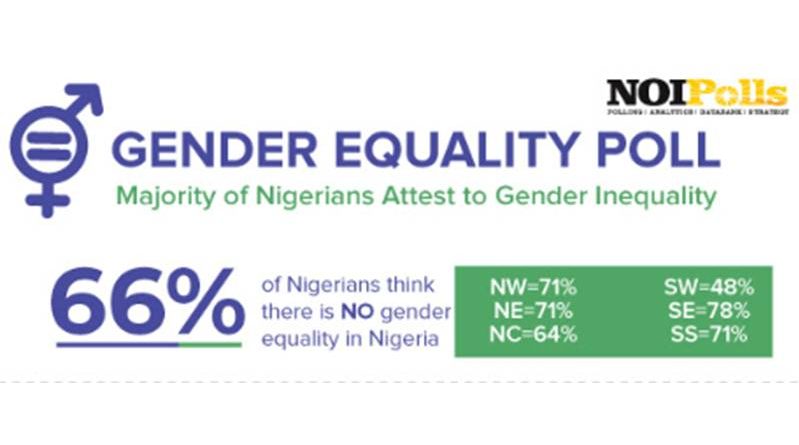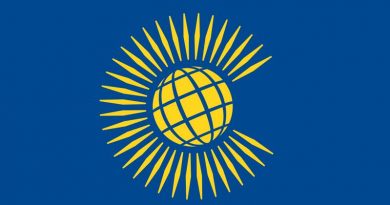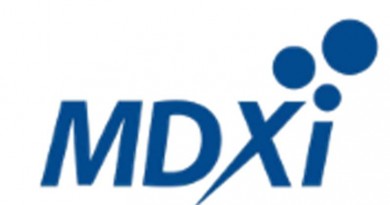Majority of Nigerians Attest to Gender Inequality
NOIPolls joined the rest of the world in celebrating the 2020 International Women’s Day (IWD) on 8th March, 2020. The IWD is a worldwide annual event aimed at achieving the gender equality globally. The theme for this year is “I am Generation Equality: Realizing Women’s Rights”, #EachforEqual. The Day was an opportunity to reflect on the progress made, to call for change and to celebrate acts of courage and determination by ordinary women, who have played an extraordinary role in the history of their countries and communities.
In commemoration of the IWD, NOIPolls conducted a public opinion poll to gauge the perception of Nigerians on gender equality in the country. The poll result revealed that there is an enormous gap in gender equality in Nigeria especially in politics, family and the society at large. 66 percent of Nigerians were of the view that there is gender inequality in Nigeria, however, 73 percent admitted that there should be gender equality regardless of what the current situation is in the country.
Further findings revealed that women are not currently given equal opportunities as men in politics, family and the society as stated by more than 56 percent of the respondents in each category. However, this perception is slightly different with respect to workplace as 54 percent of Nigerians agreed that women are currently given equal opportunity as men in that area. It is therefore, important that the issue of gender inequality is tackled to allow for diversity of opinion and participation of different groups in the country. Interestingly, 65% of Nigerians are of the opinion that status quo should be maintained while 15 percent believe that gender equality can be achieved by passing the Gender and Equal Opportunity Bill (GEOB) by members of the National Assembly.
Lastly, most Nigerians (62 percent) disclosed that gender should not be considered when deciding on a leadership position rather merit, capability and qualification should be the yardstick for deciding leadership positions. Hence, this is a call that women should be in the fore front of societal development as well as having a better representation in leadership positions. These are key findings from the gender equality poll conducted in the week commencing February 24th, 2020.
Survey Background
International Women’s day is a day set aside by the United Nations to celebrate women and their achievement in various facets of life. It also a day to reflects on the progress made in the pursuit of gender equality given that no country in the world has achieved gender equality. Statistics has shown that about 2.7 billion women around the world could not access the same choice of jobs as men because of legal restrictions which clearly shows the issue of gender inequality in the world.[1] Also, less than 25 percent of parliamentarians around the world were women as of 2019.[2]
Although, it has been shown that despite achievement of women in various aspects of human endeavour, the change regarding gender equality is agonizingly slow for majority of women and girls around the world. Hence, this calls for more action to realize the dream of gender equality globally. The year 2020 represents an unmissable opportunity to mobilize global action to achieve gender equality and human rights of all women and girls. Against this background, NOIPolls conducted a public opinion poll to gauge the perception of Nigerians regarding gender equality in Nigeria.
Survey Findings
The first question gauged the status quo with respect to gender equality in the country currently. The poll result revealed that slightly more than 3 in 10 adult Nigerians indicated that there is gender equality in the country whereas majority of the respondents stated otherwise. Analysis by gender showed that there are more male (41 percent) than female (27 percent) respondent who mentioned that there is gender equality in the country.

Regardless of previous response, respondents were asked: Do you think there should be gender equality in Nigeria? Ironically, the findings disclosed that a greater proportion of Nigerians (73 percent) believe that they should be gender equality in the country. As expected, there are more female (80 percent) than male respondents who believe that there should be gender equality in the country.
Further analysis by geo-political zone showed that the South-West zone (88 percent) had more respondents who believe that there should be gender equality in Nigeria whereas the North-East zone (44 percent) had more respondents who said that there should not be gender equality in Nigeria.

Subsequently, a current assessment of gender equality in some aspect of life revealed that women are only given opportunities as men in workplaces as disclosed by 54 percent of Nigerians interviewed. On the other hand, with regards to politics (61 percent), family (57 percent) and the society (56 percent) Nigerians disagreed that women are currently given equal opportunities as men in these aspects.

Similarly, it is interesting to note that Nigerians agreed that women should be given equal opportunities as men in workplace (88 percent), politics (76 percent), society (76 percent) and family (65 percent).

With regards to recommendations, it is shocking that, a larger proportion of Nigerians (65 percent) suggested that the status quo in gender should be maintained as it is currently. However, while 20 percent Nigerians advocated that women should be given equal opportunity as men in governance, 15 percent proposed making policies to support gender equality in the Nigeria.

Furthermore, when respondents were asked: Do you think gender should be considered when deciding on a leadership position? Finding revealed that 38 percent of the Nigerians said yes while 62 percent responded negatively. Analysis by gender showed that there are more female (69 percent) than male (55 percent) respondents who mentioned that gender should not be considered when deciding a leadership position.

Of the 38 percent who indicated that gender should be considered, 24 percent stated this because they believe that some leadership positions are gender sensitive hence is should be taken into consideration when deciding a leadership position. Other reasons given are because ‘men are the head of house’ (20 percent), ‘some religion does not support women leading the society’ (18 percent) and ‘women are to weak to lead’ (18 percent) amongst other reasons.

Likewise, of the 62 percent who stated that gender should not be considered, 43 percent insisted that merit, capability and qualification should be a yardstick for electing people into leadership positions. This is followed by Nigerians (29 percent) who asserted that all humans are equal before the law and 25 percent who mentioned that women can do better than men when it comes to leadership amongst other reasons.

In conclusion, the poll has revealed that there is an enormous gap in gender equality in Nigeria especially in politics, family and the society at large. Therefore, it is pertinent that the issue of gender inequality is tackled to allow for diversity of opinion and participation of different groups in the country. Also, gender equality can be achieved by passing the Gender and Equal Opportunity Bill (GEOB) by members of the National Assembly as advocated by 15 percent of Nigerians.
Finally, findings from the poll revealed that most Nigerians (62 percent) stated that gender should not be considered when deciding on a leadership position rather merit, capability and qualification should be the yardstick for deciding leadership positions. Hence, this is a call for women to ensure that the level of participation in position of leadership in the society increases as this will foster a better representative of women in leadership positions.
Survey Methods
The poll was conducted in the week commencing February 24th, 2020. It involved telephone interviews of a proportionate nationwide sample of 1,000 randomly selected phone-owning Nigerians aged 18 years and above, representing the six geo-political regions and 36 states and the FCT of the country. Interviews were conducted in 5 languages – Igbo, Hausa, Yoruba, Pidgin English and English. With this sample size and selection, we are 95% confident that the results obtained are statistically precise within a margin of error of plus or minus 4.65%.
We recognize that the exclusive use of telephone polling has its limitation of excluding non-phone-owning Nigerians. Nonetheless, with the country’s tele density put over 100 percent by the Nigerian Communications Commission (NCC), we consider our telephone polling approach appropriate. Also, given the rigorous scientific process of randomization and stratification applied, we are confident of the validity of our methodology and approach. NOIPolls Limited, No1 for country specific polling services in West Africa. We conduct periodic opinion polls and studies on various socio-economic and political issues in Nigeria. More information is available at www.noi-polls.com.
This press release has been produced by NOIPolls Limited to provide information on all issues which form the subject matter of the document. Kindly note that while we are willing to share results from our polls with the general public, we only request that NOIPolls be acknowledged as author whenever and wherever our poll results are used, cited or published.
NOIPolls hereby certifies that all the views expressed in this document accurately reflect its views of respondents surveyed for the poll, and background information is based on information from various sources that it believes are reliable; however, no representation is made that it is accurate or complete. Whilst reasonable care has been taken in preparing this document, no responsibility or liability is accepted for errors or fact or for any views expressed herein by NOIPolls for actions taken as a result of information provided in this report. Any ratings, forecasts, estimates, opinions or views herein constitute a judgment as at the date of this document. If the date of this document is not current, the views and content may not reflect NOIPolls’ current findings and/or thinking.




